What's the most popular second job or extra income for MSPs?
- Published
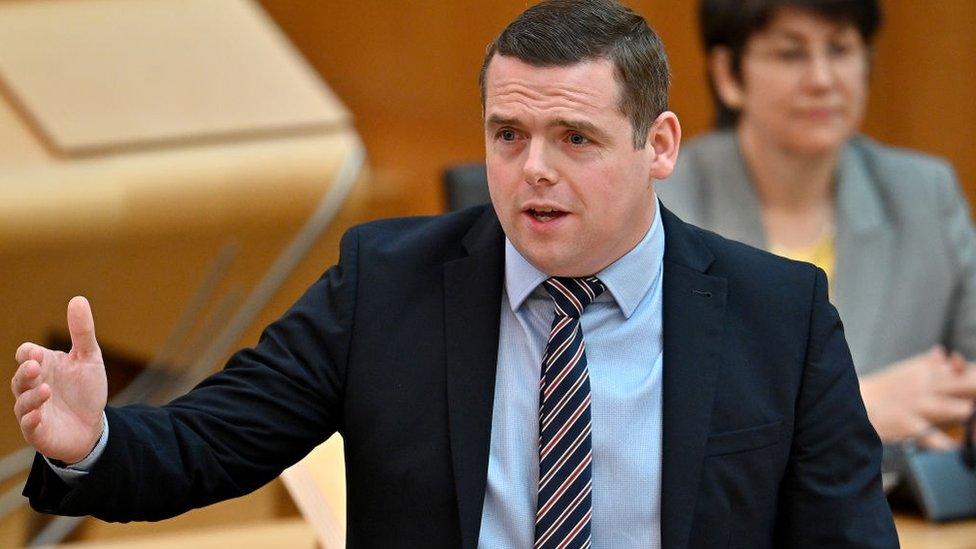
The most prominent example of MSP "double jobbing" right now is Conservative leader Douglas Ross
With Westminster in turmoil over the question of whether MPs should be allowed to hold second jobs, what is the situation at Holyrood? How many MSPs have reported income on top of their salary, and where is it coming from?

Scandals about second jobs have been relatively few and far between at Holyrood. In 2019, even the suggestion that former Conservative leader Ruth Davidson might take up a paid post with a lobbying firm was enough to spark such an outcry that she changed her mind and turned the job down.
Labour's Neil Findlay actually lodged a members bill, external seeking to ban MSPs from certain external jobs, but found relatively few supporters for it across the chamber - despite some sympathy from SNP and Green backbenchers.
It may depend on what is categorised as a "second job", but at present fully one-third of MSPs - 45 of the 129 - have reported some kind of income above and beyond their Holyrood salary, including members of every party.
In the vast majority of cases, the sums of money involved are not huge, and there are many caveats in terms of things like charitable donations and rental arrangements which actually make a loss.
However, despite the fact that everything from gifts and funded overseas trips to heritable property and shares must be declared, it can sometimes be difficult to work out exactly how much money some members are making.
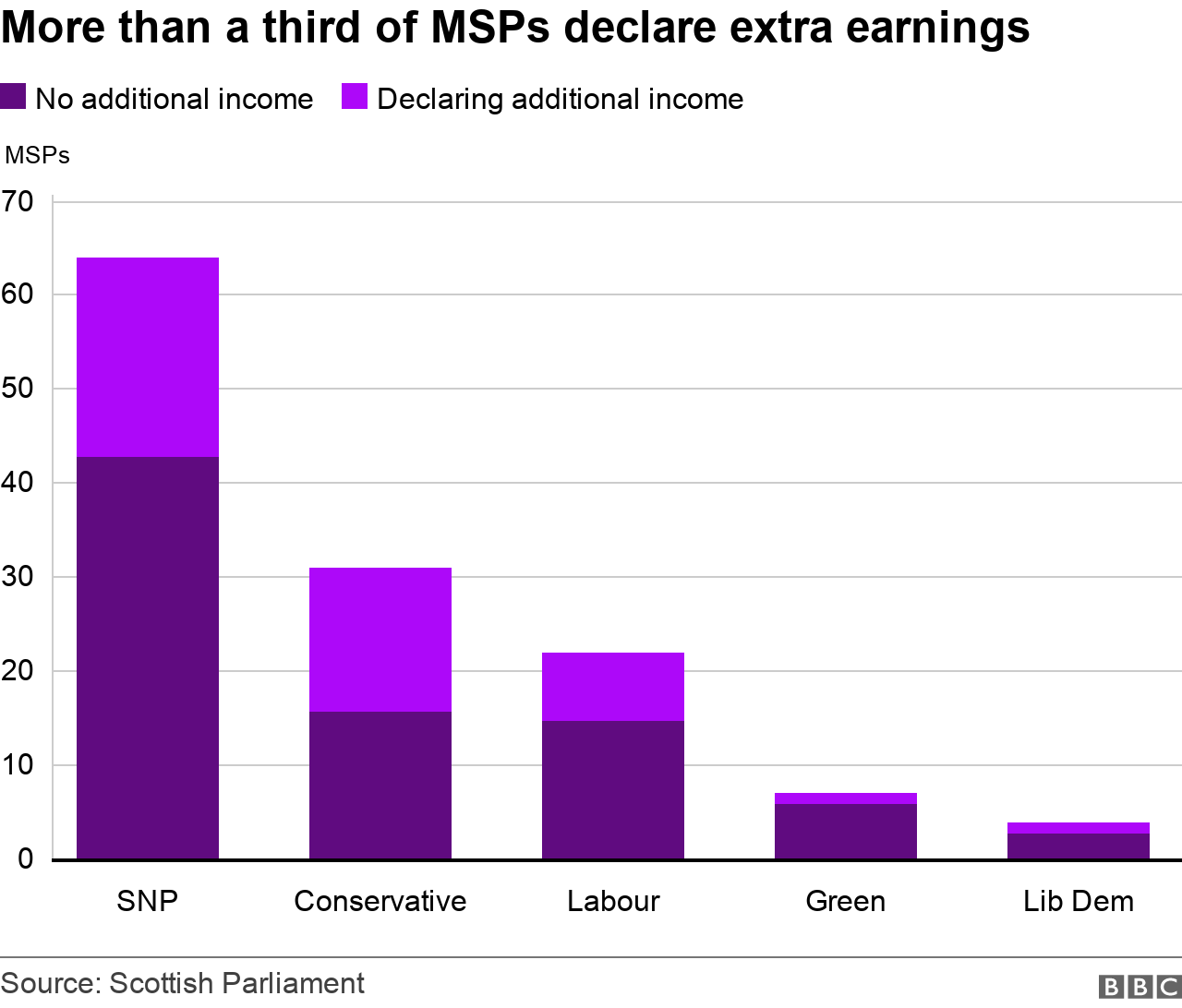
As at Westminster, registers of interests are not neatly standardised.
For example, most MSPs who own companies declare their commercial income as a gross figure, subject to unquantified costs and losses. Some spell out exactly how much they expect to withdraw for themselves, while others offer an estimate of how the pandemic has hit revenues.
The same is true of those who rent out property. And adding another layer of complexity, some own a "part-share" in a house or firm, and then declare its gross income without detailing precisely what their cut of that might be.
And while many MSPs have declared nothing at all, others have been so diligent that they have formally noted their party membership as a potential interest.
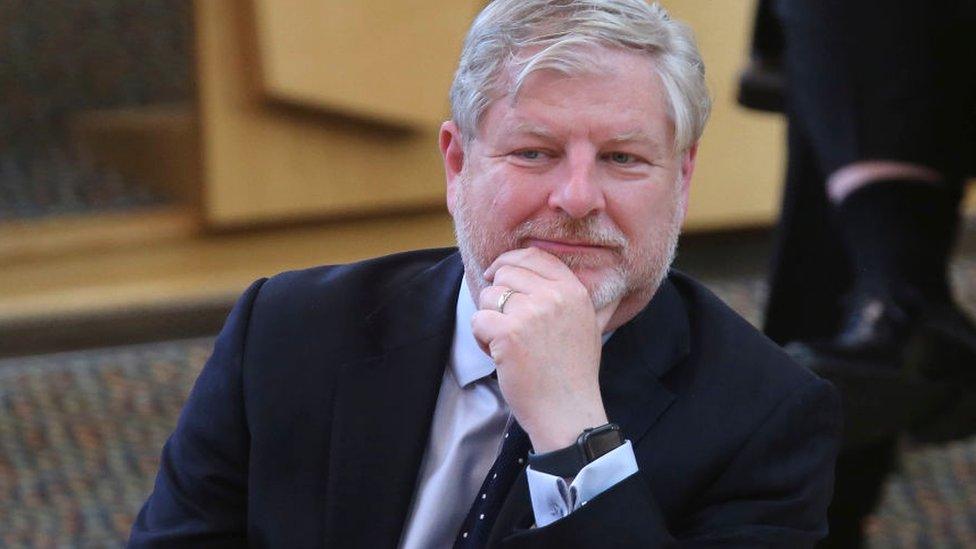
SNP Constitution Secretary Angus Robertson is managing director of two firms
The most prominent example of "double jobbing" right now is Douglas Ross, the Scottish Conservative leader who also serves as MP for Moray.
This kind of dual mandate is not particularly unusual. Holyrood has specific rules for just such an occurrence, which mean Mr Ross's MSP salary is reduced, and he donates it to charity - even if he did apparently forget to register it with the Westminster authorities.
There are also 17 other MSPs who currently hold another elected position - all local councillors, and members who were elected to Holyrood for the first time in May. This includes 11 SNP members, four Conservatives and two from Labour.
Most of these new MSPs have indicated they will be stepping down from their council jobs when local elections roll around in 2022 - presumably to avoid forcing a round of costly by-elections this close to the end of term, although a few former councillors did quit after becoming MSPs in May.
And many - although not all - say they will be donating their £18,000 salary to charity now that they are receiving a larger salary from parliament.
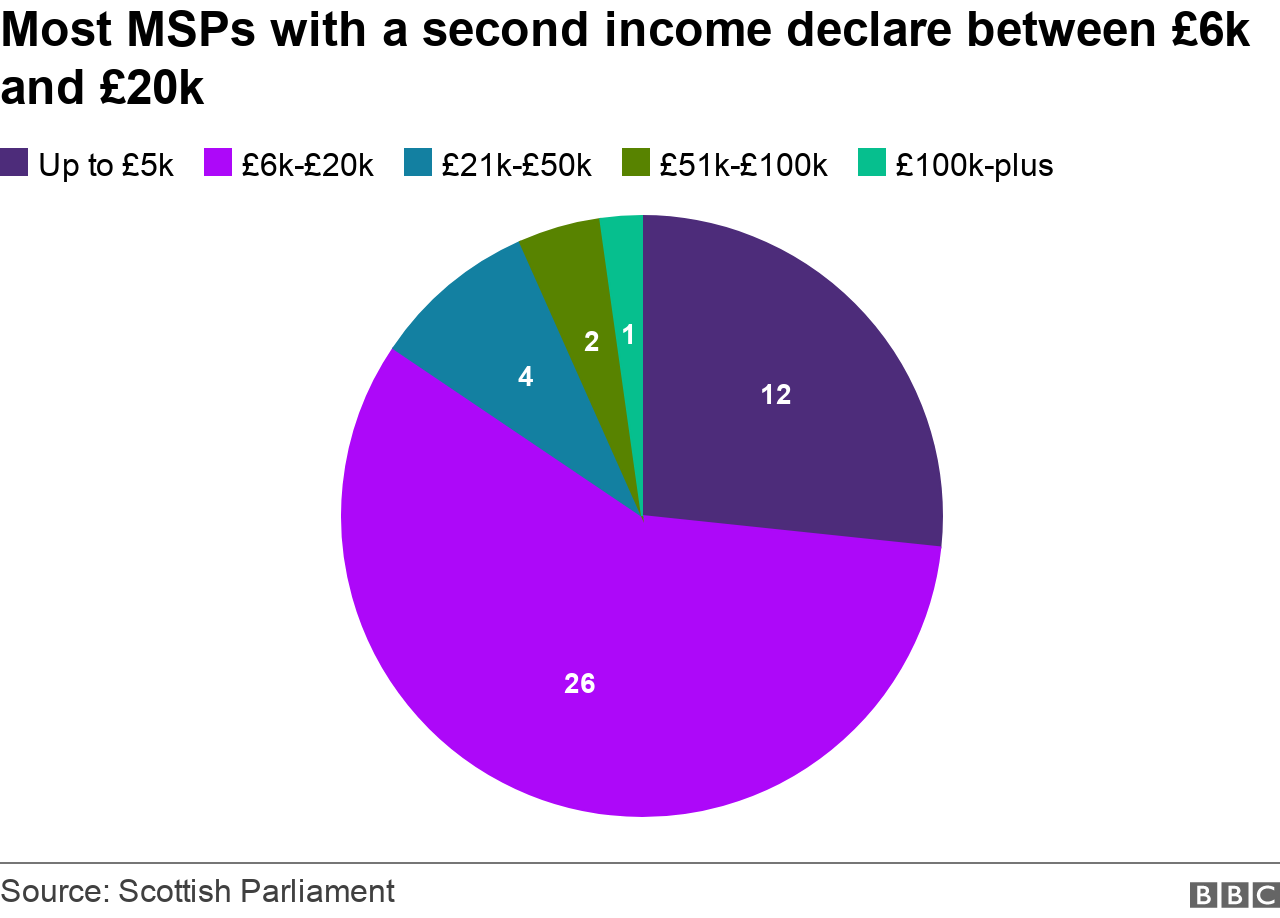
A number of MSPs have company directorships - although in many cases with the firms they ran themselves before entering politics.
In many cases, these firms are essentially dormant; for example the SNP's Constitution Secretary Angus Robertson is managing director of two firms, focused on opinion polling and management consultancy, but says he "will not undertake any work" for them having now become an MSP.
Among active directorships, the biggest earners are Conservative MSPs - like Aberdeenshire West representative Alexander Burnett, who owns an estate and is listed as the beneficiary of a pair of trusts which add up to more than £30m in value.
He has a number of company directorships, the most lucrative being of his own AJA Burnett Estate, which encompasses various agricultural, residential and commercial lettings as well as forestry and sporting interests, and generates a gross annual income of up to £580,000.
Mr Burnett stated that he expected to withdraw up to £180,000 from the firm in 2021-22 - a reasonably rare example of the register being clear about exactly how much money an MSP expects to take home from their business.
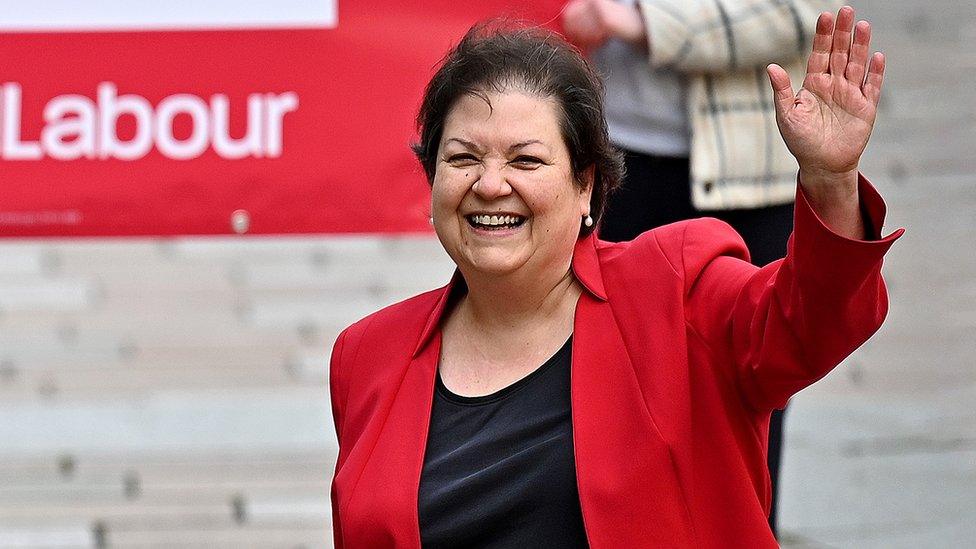
Labour deputy leader Jackie Baillie lets out a flat in Portugal
Another Tory MSP, Donald Cameron, owns the Achnacarry Estate in the Highlands - the ancestral seat of Clan Cameron.
The estate had income of between £830,000 and £840,000 last year, with a range of interests from residential, holiday and crofting lets to renewable energy, telecoms and deerstalking. However, Mr Cameron noted this gross figure does not take account of costs and losses to the business, leaving it unclear what the overall level of profit - if any - might have been.
In previous years' register entries he has stated that he was not in receipt of any taxable income from the estate, but there is no mention of this on the current register.
Mr Cameron is also a non-executive director of the Edinburgh Worldwide Investment Trust, which pays him between £25,000 and £30,000 to attend five half-day board meetings per year. He had a similar role with another investment firm, the Murray Income Trust, with the same recorded pay and hours, before retiring on 2 November 2021.
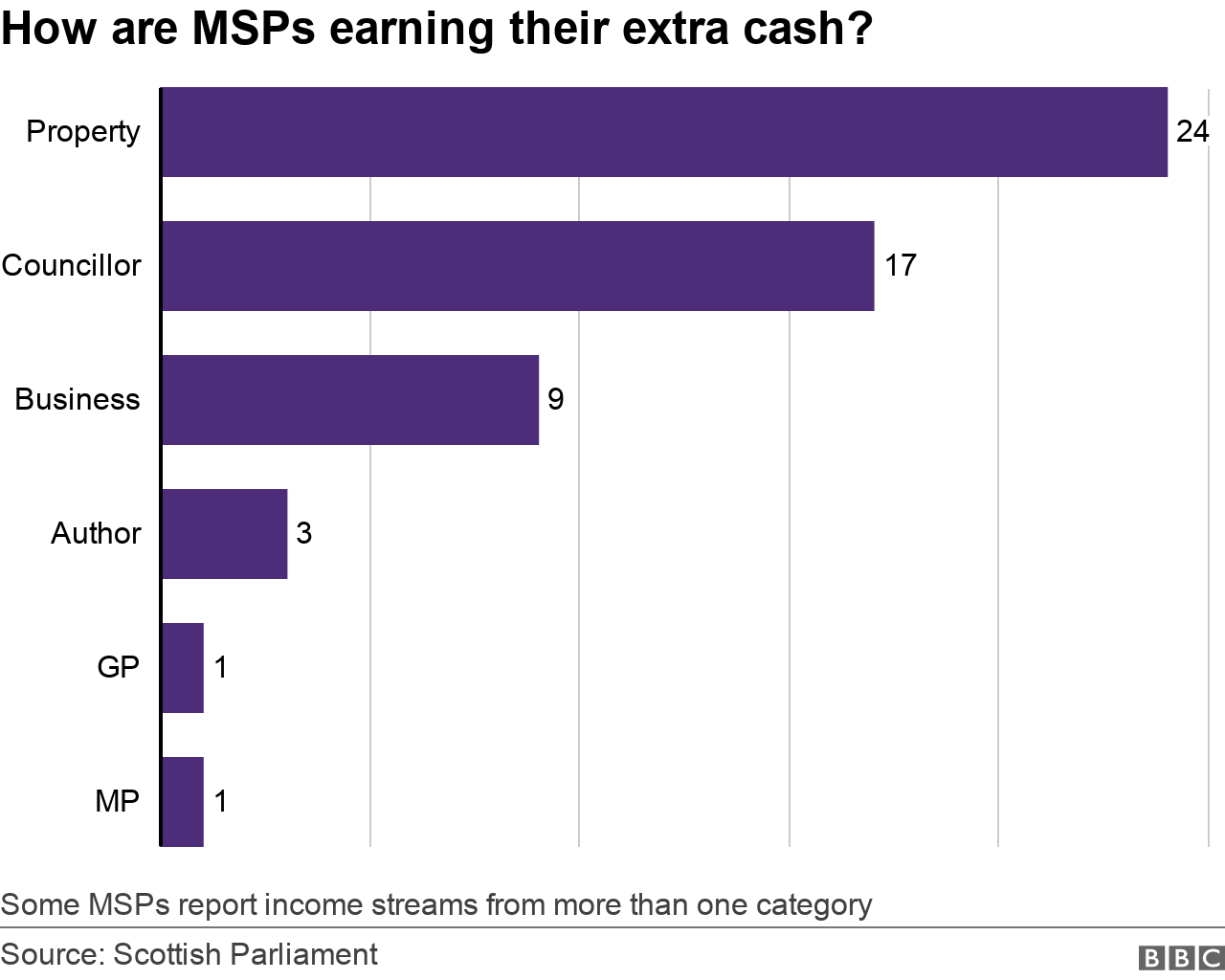
Beyond those with large estates, there are a lot of landlords at Holyrood. A total of 24 different MSPs have declared property holdings, from flats to commercial premises to farmland.
These properties are scattered across Scotland and beyond - Labour's deputy leader Jackie Baillie lets out a flat in Portugal - and range in scale from Rhoda Grant's one-sixth share of a house in Lewis to Edward Mountain's collection of cottages in Moray.
Letting out a flat may not be a "second job" in the traditional sense of requiring regular working hours. But it does mean there is a sizable bloc of MSPs who have an interest to declare when the parliament is considering live issues like rent controls or regulating short-term lets.
In terms of the rents being charged, none of the sums involved is particularly staggering. Indeed, a handful of members say their properties yield so little money that they don't turn a profit.
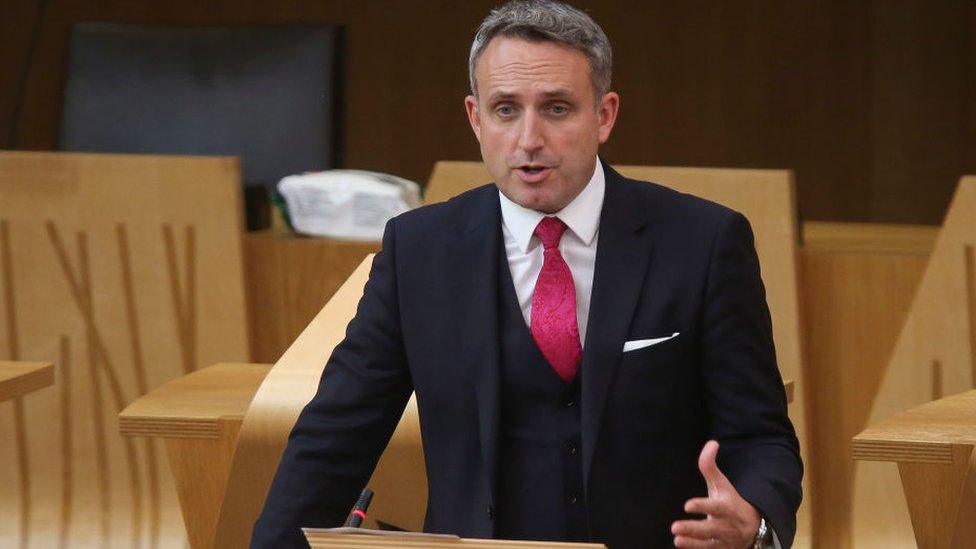
Lib Dem leader Alex Cole-Hamilton sub-lets part of his home on Airbnb.
For example, Net Zero Secretary Michael Matheson says he owns a house in the Highlands that generates an income of between £10,000 and £15,000 a year, but that "it does not make a profit due to running costs".
It doesn't even need to be a whole property - Lib Dem leader Alex Cole-Hamilton brings in between £5,000 and £10,000 a year sub-letting part of his home on Airbnb.
At the other end of the hospitality scale, two MSPs own hotels with their partners. Both Tory Rachael Hamilton and the SNP's Emma Harper host guests in the south of Scotland - although Ms Hamilton paid her £2,000 of dividends straight back into the company last year, while Ms Harper only takes £3,000 in remuneration from her guest house.
Ms Harper also volunteers as a nurse, and is not the only MSP working in the health service - Conservative health spokesman Sandesh Gulhane works one day a week as a GP.
These are of course the kind of "second jobs" that politicians routinely point to in defence when the issue comes up - worthy endeavours which contribute both to society and to parliament's collective understanding of a crucial field like primary care.
Meanwhile three MSPs also receive royalties from books they wrote prior to being elected, including Green MSP Ariane Burgess and SNP ministers Angus Robertson and Jenny Gilruth - who wrote a school textbook in her previous life as a teacher.